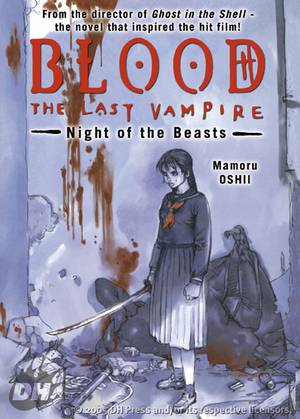Blood: The Last Vampire – Night of the Beasts
?Author: Mamoru Oshii
Publisher: DH Press
ISBN; 10: 1-59582-029-9
?ISBN; 13: 978-1-59582-029-7
“An original novel inspired by the hit film,” the blurb says, which is not quite accurate. When the Japanese 2000 anime movie Blood: The Last Vampire was released in America in 2001, it was announced that its story was divided into three parts — the movie, a novel, and a video game – and that one had to see/read/play all three to understand what was really going on. But only the movie was available to Americans then. This 2005 American edition is the second third of the trilogy; a horror novel by the movie’s producer, Mamoru Oshii, with cover art by Katsuya Terada, a character designer of the movie and the video game.
Unfortunately, Night of the Beasts is recommended for diehard fans of the movie only. The movie is a suspenseful and gripping thriller, whereas this book is the slowest-paced novel I have ever read. It complete lacks either horror or suspense.
Set in 1969 (three years after the movie), the protagonist is Rei Miwa, a high school radical student protestor. While fleeing riot police he stumbles upon an apparent schoolgirl with a samurai sword slaying a monster. Shortly after, Rei’s radical group becomes aware that other high school radical cliques are losing members by disappearances or deaths, and in every case the same mysterious schoolgirl, Saya, has briefly transferred to their school – a girl Rei recognizes as the monster-slayer. Rei’s group blusters about doing something, but is startled when Gotouda, a plainclothes police detective, barges in and high-pressures them into helping him investigate the mystery – after letting Rei know that he is aware Rei has seen Saya in action.
The story is constantly interrupted by long digressions on how Japanese radical student protest groups operate, how the police file death certificates (“In addition to natural deaths and deaths from illnesses, there were also exogenous deaths, or deaths that were caused by external forces. Under the medical examiner system, these deaths were considered unnatural deaths, and an unnatural-death report had to be filed with the police. The police would then conduct an autopsy, but this was supported from a clinical standpoint by a medical examiner’s autopsy, or postmortem examination. The medical examiner could also decide to call for an administrative autopsy. If this was conducted at the order of a detective, it was referred to as a judicial autopsy.”), the history of anthropological research, the philosophy of humanism, and similar topics until Rei’s head is spinning. There is no action until page 277 of this 298-page novel. Yes, important new information about who Saya really is is finally revealed, but most readers will have given up before reaching this point.






